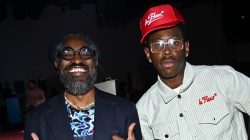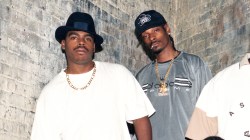The talk of the town right now is Black Dynamite. Over 30 years since the artistic wave of critically-acclaimed, cult-followed and low-budget urban films took back a piece of Hollywood, Michael Jai White‘s brainchild pays homage and breaks new ground at once. In a conversation this month in Philadelphia with HipHopDX, White chronicled the importance of the so-called Blaxploitation genre. “First of all, these movies saved the Hollywood studio system. When television got very, very popular and international and foreign films got very big, it really started hurtin’ the pocketbooks of the studio films. When the urban films started up, they were such a cash-heavy thing,” said Black Dynamite‘s writer and star. “That’s why they started cranking these things out left and right, and became exploitive – Blackploitation, so to speak. That word got attributed to movies that didn’t deserve it, movies that were really just truly great movies.” An avid fan of late ’60s and ’70s urban films, White says that it’s high and low-brow films that are channeled in his film co-starring Arsenio Hall and Tommy Davidson. “What we try to do with [Black Dynamite] is pay hommage to the entire genre – the great ones and the not-so-great ones sometimes.”
As Hollywood is still far from an equal racial playing field, Michael Jai White also told DX about the important hero aesthetic for audiences in these films. “This was the first time black people were seen in heroic fashion. Up until that time, we were just seen as butlers, maids and stuff. When you’ve got people like Jim Brown and Fred Williamson kicking ass and being alpha males, it was a very liberating experience. Not only were they welcomed action figures for the black community, but for the white community as well.“
Those films of yesteryear play a large role in the 2009 film. For nostalgic fans and new viewers alike, Black Dynamite has a lot of jewels. “I’ve got dialog, famous lines that was lifted. There’s a pool-room fight scene that does direct hommage to one of the coolest movies ever, which was Trouble Man. There’s a plot point that alludes to Three The Hard Way, that whole conspirital tone – sometimes wildly conspirital.” Beyond simple cut-and-paste recreations, the film artistically combines visual allusions from Willie Dynamite with dialog from The Mack. The fast-paced shooting schedules of lesser quality ’70s films also plays an artistic role, as White says, “Sometimes the boom mic gets into the shot…For people that really recognize this genre, they’re gonna recognize a whole lot of stuff.”
Whereas films like 1989’s Wayans family ensemble have attempted previous revues, White and other producers were careful to be accurate to the script’s core. “We didn’t want to do any cutesy stuff, like cast a bunch of people from the Blaxploitation era. That destroys the illusion; that person would have been young back then. We really wanted to preserve that line.”
With that attention to detail, White also explained how they wrote Black Dyamite as a heroic character that balances his tough-guy persona with a sense of humor and a sense of cool. “It starts with a character. The character will [bring] in things that will go out of the box. If you have a fully realized character, and something happens in the room that makes that character respond, as long as that character responds in kind in the truth of that character, you maintain normalcy. You maintain an organic representation. It starts there.”
Although the film is set in the ’70s, it has ties to Hip Hop, including an “inspired by” song, “The Feeling,” [click to listen] from Buckshot, 9th Wonder and Sean Price. White spoke about the parrallels between the urban film movement of the ’70s and the formative years of Hip Hop, both voices of rebellion subsequently embraced in the mainstream. “[Hip Hop is] born from the streets. Both are born of the streets – of and for the people. When Melvin Van Peebles made Sweet Sweetback’s Badasssss Song, it was nothing that the status quo was going to do. But you see, him getting it to the theater, you saw what it could to do. [This is] just like Hip Hop: when the people wanted it, they tried to it over,” said White. “It’s hard for them to reproduce Hip Hop that. It still remains something that only a unique body of people can do – somebody has to be in the struggle to create.“
Black Dynamite is in theaters now.








